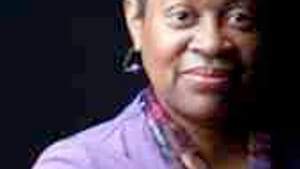Stay in the Loop
BSR publishes on a weekly schedule, with an email newsletter every Wednesday and Thursday morning. There’s no paywall, and subscribing is always free.
Musicians who crossed the color line
Elaine Mack's "Black Classical Musicians'

I recently read about a team from an all-white sorority that won a competition in step-dancing, which has its roots in Africa and is typically associated with African Americans. Some black people were outraged by the victory, accusing the judges of favoritism. Others were equally outraged by the thought that white people had once again "stolen" something (e.g., jazz, gospel, rock "'n roll) that is "ours."
As a black classical musician, I find this reaction ironic. Do some forms of artistic expression belong only to the people who originated them? If that's the case, I have no right to play the music I've been associated with for most of my life.
To be sure, the notion that certain people should be excluded from certain types of cultural expression is nothing new, as I'm reminded by Elaine Mack's Black Classical Musicians in Philadelphia.
Elaine Mack is a classical cellist who moved to Philadelphia from Chicago in 1989. "A I started attending concerts and performing in Philadelphia," she writes, "I began to meet people who not only had interesting stories and anecdotes to tell individually, but collectively depicted an historic and cultural scene worth recording." Over 14 years she taped lively and varied conversations with musicians, patrons and promoters— both the well known (Leon Bates, John Blake, Sylvia Olden Lee) and the obscure.
Household slaves vs. field hands
Despite the variety, trends emerge. Mack's eldest interview subjects, born between 1902 and 1916, generally approached classical music as a legitimizing thing, almost a way to show white society that "yes, we can" perform great (i.e., European classical) music. Underlying their reflections is a dismissal of the popular musical forms associated with the black experience— much the way household slaves once looked down upon field hands.
That said, their stories constitute an inspiring reminder of the rewards of determination and courage. In the 1930s and '40s, many black musicians were able to pursue careers only in Europe, or by studying with transplanted Europeans who didn't understand American-style racism. Harpist Ann Hobson-Pilot recalls having to get special permission from the other students to stay in a dormitory at a summer music camp after having been denied attendance the previous year when word got out that a black student had been accepted.
Color-blind school program
The generation that came of age in the 1950s and '60s enjoyed the benefit of the Philadelphia school system's excellent, color-blind music program, established by Louis Wersen, whose name is mentioned with gratitude repeatedly. This age group also shows an awakening sense of black pride, which continues to grow in subsequent generations; with few exceptions, musicians no longer need to downplay the validity of music with African roots.
Later in the book, though, black pride seems to go awry, morphing into the still evident mentality that people who strive to do things that aren't "traditionally black" are rejecting their racial identity.
Elvis Presley's advantage
Despite their perseverance, many musicians profiled by Mack were disgusted or saddened by the artificial obstacles they'd encountered, and many refer to people who simply gave up. And therein lies the critical difference between white step-dancers and black classical musicians.
Historically, black people who are strong enough emotionally to handle the pressure of entering "white" arenas must struggle financially in their chosen musical path. White performers who play "black" music have tended to profit far more than the originators. Think of Elvis Presley, say, or Pat Boone, who introduced black songs to much larger and more lucrative white audiences.
The tide has finally turned in this regard, at least somewhat. But the resentment remains, especially in an age of budget cutbacks in schools and performing arts companies. The solution, according to Mack, is to foster a love of music— period.♦
To read responses, click here and here.
As a black classical musician, I find this reaction ironic. Do some forms of artistic expression belong only to the people who originated them? If that's the case, I have no right to play the music I've been associated with for most of my life.
To be sure, the notion that certain people should be excluded from certain types of cultural expression is nothing new, as I'm reminded by Elaine Mack's Black Classical Musicians in Philadelphia.
Elaine Mack is a classical cellist who moved to Philadelphia from Chicago in 1989. "A I started attending concerts and performing in Philadelphia," she writes, "I began to meet people who not only had interesting stories and anecdotes to tell individually, but collectively depicted an historic and cultural scene worth recording." Over 14 years she taped lively and varied conversations with musicians, patrons and promoters— both the well known (Leon Bates, John Blake, Sylvia Olden Lee) and the obscure.
Household slaves vs. field hands
Despite the variety, trends emerge. Mack's eldest interview subjects, born between 1902 and 1916, generally approached classical music as a legitimizing thing, almost a way to show white society that "yes, we can" perform great (i.e., European classical) music. Underlying their reflections is a dismissal of the popular musical forms associated with the black experience— much the way household slaves once looked down upon field hands.
That said, their stories constitute an inspiring reminder of the rewards of determination and courage. In the 1930s and '40s, many black musicians were able to pursue careers only in Europe, or by studying with transplanted Europeans who didn't understand American-style racism. Harpist Ann Hobson-Pilot recalls having to get special permission from the other students to stay in a dormitory at a summer music camp after having been denied attendance the previous year when word got out that a black student had been accepted.
Color-blind school program
The generation that came of age in the 1950s and '60s enjoyed the benefit of the Philadelphia school system's excellent, color-blind music program, established by Louis Wersen, whose name is mentioned with gratitude repeatedly. This age group also shows an awakening sense of black pride, which continues to grow in subsequent generations; with few exceptions, musicians no longer need to downplay the validity of music with African roots.
Later in the book, though, black pride seems to go awry, morphing into the still evident mentality that people who strive to do things that aren't "traditionally black" are rejecting their racial identity.
Elvis Presley's advantage
Despite their perseverance, many musicians profiled by Mack were disgusted or saddened by the artificial obstacles they'd encountered, and many refer to people who simply gave up. And therein lies the critical difference between white step-dancers and black classical musicians.
Historically, black people who are strong enough emotionally to handle the pressure of entering "white" arenas must struggle financially in their chosen musical path. White performers who play "black" music have tended to profit far more than the originators. Think of Elvis Presley, say, or Pat Boone, who introduced black songs to much larger and more lucrative white audiences.
The tide has finally turned in this regard, at least somewhat. But the resentment remains, especially in an age of budget cutbacks in schools and performing arts companies. The solution, according to Mack, is to foster a love of music— period.♦
To read responses, click here and here.
What, When, Where
Black Classical Musicians in Philadelphia: Oral Histories Covering Four Generations. By Elaine Mack. Writing Our World Press, 2009. 442 pages; $29.95. www.amazon.com/Black-Classical-Musicians.
Sign up for our newsletter
All of the week's new articles, all in one place. Sign up for the free weekly BSR newsletters, and don't miss a conversation.

 Maria Thompson Corley
Maria Thompson Corley